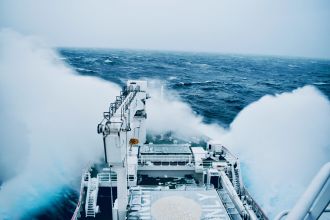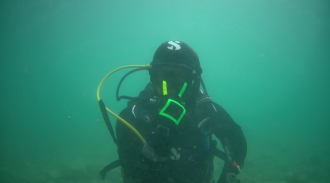-
Giant rogue waves: Southern Ocean expedition reveals wind as key cause
Physical Review Letters
A University of Melbourne expedition to the southernmost waters encircling Antarctica has discovered that wind drives the formation of colossal rogue waves, and that these unpredictable waves occur more frequently than scientists had previously Read more about Giant rogue waves: Southern Ocean expedition reveals wind as key cause
Australia; International; VICThe University of Melbourne|Swinburne University of Technology -
Combatting disruptive ‘noise’ in quantum communication
Nature Communications
An experiment has demonstrated how networks can be leveraged to combat disruptive ‘noise’ in quantum communications. The international effort led by researchers from Griffith University’s Centre for Quantum Dynamics highlights the potential of Read more about Combatting disruptive ‘noise’ in quantum communication
Australia; International; NSW; QLDGriffith University|The University of New South Wales -
Private equity purchases of Aussie healthcare grew to $4.5 billion in 2022
Medical Journal of Australia
Private equity acquisitions of Australian health care have grown over the past fifteen years, reaching $4. 5 billion in 2022, according to new data. The researchers identified a total of 75 private equity acquisitions of health care delivery assets Read more about Private equity purchases of Aussie healthcare grew to $4.5 billion in 2022
Australia; International; TASUniversity of Tasmania|Harvard University, USA -
Melbourne radio wave exposure consistent over time
Environmental Research
Environmental exposure to radio waves from wireless technology has not changed significantly in Melbourne over the last decade, a study led by scientists at the Australian Radiation Protection and Nuclear Safety Agency (ARPANSA) finds. Environmental Read more about Melbourne radio wave exposure consistent over time
Australia; VICAustralian Radiation Protection and Nuclear Safety Agency (ARPANSA)... -
Three new giant kangaroos bound back from the past
Megataxa
Palaeontologists from Flinders University have described three unusual new species of giant fossil kangaroo from Australia and New Guinea, finding them more diverse in shape, range and hopping method than previously thought. The three new species Read more about Three new giant kangaroos bound back from the past
Australia; Pacific; NSW; SA; TAS; NTFlinders University -
Important health information missing in online food delivery menus
Public Health Nutrition
Many menu items on online food delivery services do not display important nutritional information. Researchers say current NSW menu labelling laws need to be updated and closer monitoring needed on online food delivery services. A University of Read more about Important health information missing in online food delivery menus
Australia; NSWThe University of Sydney -
AI can write you a poem and edit your video. Now, it can help you be funnier
Association for Computing Machinery Conference on Intelligent User Interfaces - IUI 2024 Conference
University of Sydney researchers have developed an AI application using cartoons from The New Yorker to help people be funnier. University of Sydney researchers have used an AI-assisted application to help people write cartoon captions for cartoons Read more about AI can write you a poem and edit your video. Now, it can help you be funnier
Australia; NSWThe University of Sydney -
Our fur babies come with cuddles and a side of superbugs
ESCMID Global Congress
UK and Portuguese researchers presenting at ESCMID Global Congress say our pet kits and doggos could play a big part in spreading antibiotic-resistant bacteria. They found evidence of multidrug-resistant bacteria being passed between sick cats and Read more about Our fur babies come with cuddles and a side of superbugs
InternationalUniversity of Lisbon, Portugal -
LGBTQ+ young people with childhood trauma are at higher risk of phone addiction
JAMA Network Open
Young people who are not heterosexual or don't conform to gender norms are more likely to have childhood trauma, which in turn increases their risk of phone addiction, according to Chinese research. The team investigated the links between queer or Read more about LGBTQ+ young people with childhood trauma are at higher risk of phone addiction
InternationalSun Yat-sen University, China -
Overturning US abortion rights prompted a surge in women getting their tubes tied
JAMA Health Forum
The overturning of the constitutional right to abortion in the US prompted a surge in permanent contraceptive surgery in both vasectomies and women getting their tubes tied, but the response for women was double that for men, according to Read more about Overturning US abortion rights prompted a surge in women getting their tubes tied
InternationalUniversity of Pittsburgh, USA -
Bonobos are less chill than we thought
Current Biology
New international research has debunked the idea that bonobos are less aggressive than chimpanzees. Over the course of the study, bonobos had three times as many physical aggressions as chimpanzees. However, while male bonobos were almost Read more about Bonobos are less chill than we thought
InternationalUniversité Toulouse Capitole -
Reducing cholesterol in kids with high levels may help prevent heart disease later in life
JAMA
Kids who have high levels of 'bad' cholesterol (non-high-density lipoprotein cholesterol) during childhood are at an increased risk of heart disease later in life, but Australian researchers have found that this risk is reduced if their cholesterol Read more about Reducing cholesterol in kids with high levels may help prevent heart disease later in life
Australia; VICBaker Heart and Diabetes Institute -
Softer tumours may fuel more aggressive spread of triple-negative breast cancer
Advanced Science
Researchers have discovered how the mechanical properties of tumours can prime cancer cells to better survive their spread to other organs in a study using biomaterials that mimic the properties of tumours and experiments in mice. Softer tumours Read more about Softer tumours may fuel more aggressive spread of triple-negative breast cancer
Australia; NSWGarvan Institute of Medical Research -
Inflammation discovery to help fight liver disease
Science Signaling
QIMR Berghofer scientists have discovered the mechanism that causes severe inflammation among millions of people with chronic liver disease. In a world-first, QIMR Berghofer scientists have discovered the mechanism that causes severe inflammation Read more about Inflammation discovery to help fight liver disease
Australia; QLDQIMR Berghofer Medical Research Institute|The University of Queensland -
Polyester pollution is disrupting life on the seafloor
Marine Pollution Bulletin
New Zealand and international researchers have found that tiny plastic fibres from polyester materials are messing with the way organic matter is usually broken down on the seafloor. The effects of these microplastics differed depending on the Read more about Polyester pollution is disrupting life on the seafloor
Australia; New Zealand; InternationalUniversity of Auckland|University of Otago|University of Florida, Scottish Oceans Institute, University of Cape Town -
Beep boop (signed)! Underwater robots can speak sign language now
Computer Networks
Divers rely on sign-based communication to rely information underwater. Increasingly, underwater robots share this space with human divers, and communication between the two is important. Using a pre-existing set of common dive signs, a team of Read more about Beep boop (signed)! Underwater robots can speak sign language now
Australia; New ZealandUniversity of Auckland|University of Zagreb, Croatia -
Trouble on the horizon: how to make an impact based warning
International Journal of Disaster Risk Reduction
When a disaster looms, impact based warnings can be more useful for the public than outright likelihoods. It's one thing to hear "it might rain", but another to hear "we're expecting treefalls and slips in your neighborhood". To issue these warnings, Read more about Trouble on the horizon: how to make an impact based warning
New Zealand; InternationalGNS Science|Massey University -
Post-Covid kids aren't walking to school like they used to
Journal of Transport & Health
The Covid lockdown period has disrupted Kiwi kids who walk to school, with students 42% less likely to return to their usual walking commute, new research finds. It's potentially accelerated an existing trend, with the study authors saying that Read more about Post-Covid kids aren't walking to school like they used to
New ZealandUniversity of Otago|AGILE Research Ltd., Auckland University of Technology, -
Saving Queensland’s earless dragons
Remote cameras and conservation dogs will be deployed as part of a University of Queensland research project aiming to conserve four threatened Queensland reptile species. Remote cameras and conservation dogs will be deployed as part of a Read more about Saving Queensland’s earless dragons
Australia; QLDThe University of Queensland -
Displaced Ukrainians who remained in the country have increased anxiety and PTSD
PLOS Global Public Health
Displaced Ukrainians experience high levels of post-traumatic stress disorder (PTSD) and generalized anxiety, according to a survey of mental health of over 8000 people who were either refugees or people displaced within Ukraine. The participants Read more about Displaced Ukrainians who remained in the country have increased anxiety and PTSD
InternationalUniversity of Southampton, UK




















































